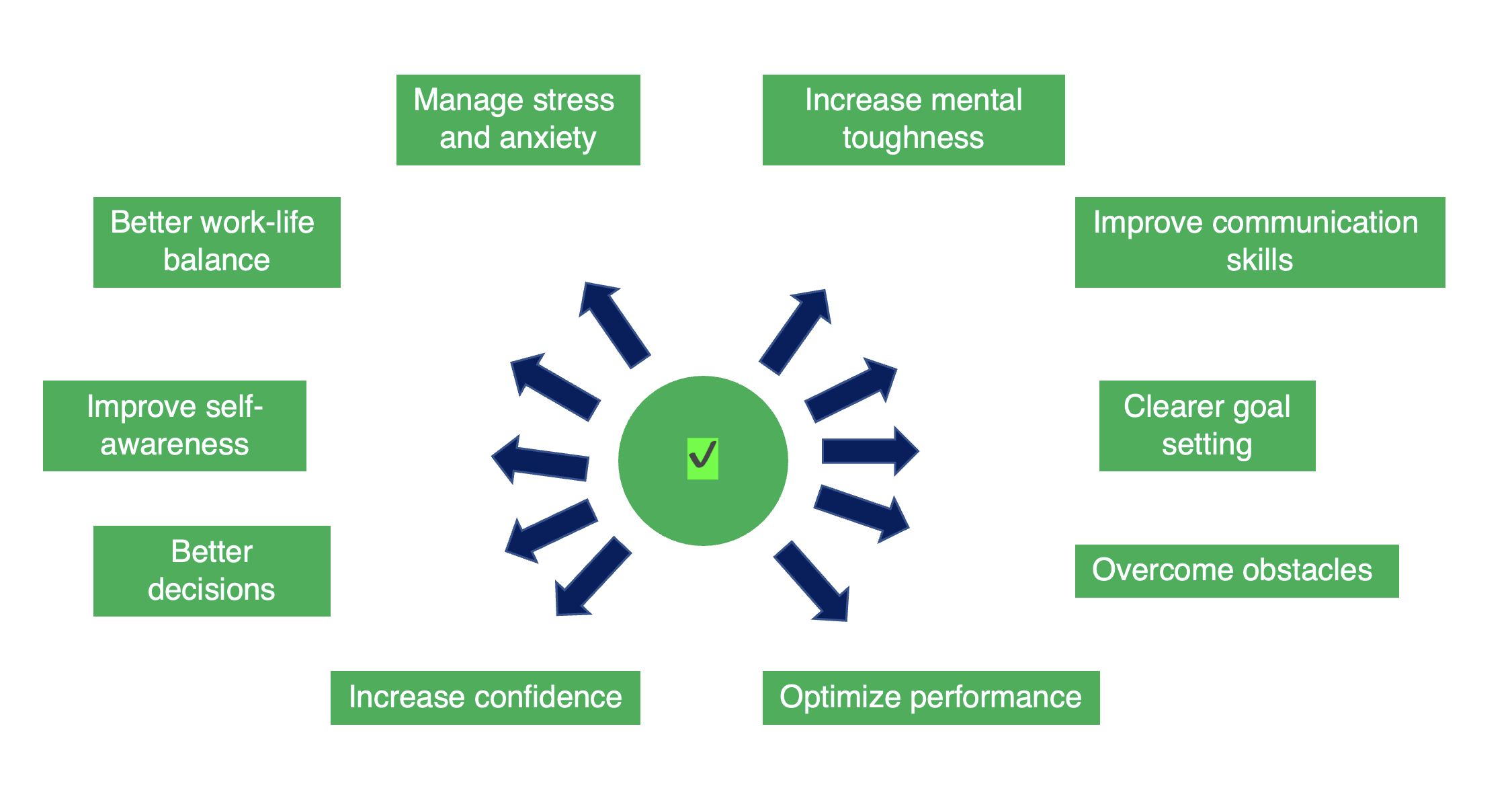"Know thyself" - Socrates
Five years ago, I wrote a blog about the inner mind game of athletes and executives, describing how coaching helped me strengthen the cognitive and emotional skills that supported my own performance. This post builds on that idea. It lays out the why, how, and what of mental performance coaching in clearer terms, informed by both research and real-world experience.
First: A Working Definition
Mental performance coaching is about helping individuals enhance their cognitive, emotional, and behavioral skills to perform better under pressure. It draws from sports psychology, cognitive-behavioral strategies, and positive psychology to build mental tools like focus, confidence, motivation, resilience, and emotional regulation.
While it's often associated with elite athletes, this work is just as relevant for anyone navigating complex, high-stakes environments: executives, founders, creatives, students, or anyone looking to sharpen their mindset and sustain performance over time.
The "Why": What Drives Mental Performance Coaching
In my experience, people rarely seek mental performance coaching because things are easy. They come because they're stuck. They’re managing pressure, performance anxiety, inconsistency, or self-doubt. And they sense that technical skills alone won’t get them through.
The "why" centers on this truth: how we think and feel directly impacts how we perform. Whether on the field, in the boardroom, or during tough conversations, our inner state shapes our outer results.
Mental performance coaching helps people develop self-awareness and mental agility. It teaches them how to stay present, focused, and resilient even when things don’t go as planned. And that shift changes everything.
Some of the core benefits include:
Greater self-awareness: Clients start noticing the stories they tell themselves under pressure. They begin to see patterns and blind spots, not as flaws, but as opportunities to adjust. This awareness becomes a foundation for change.
More consistent performance: With tools like visualization, mental rehearsal, and focus training, individuals start showing up more consistently even in unpredictable or high-pressure settings.
Better obstacle navigation: We all face barriers. Some are mental, others emotional or even physical. Coaching helps individuals name those barriers and work through them with intention, instead of reacting out of habit.
Stress management: High performers often normalize high stress. Mental performance coaching introduces techniques to regulate the nervous system, stay grounded, and respond with clarity instead of reactivity.
Clarity in goal-setting and accountability: Together, coach and client set specific, measurable, realistic goals and hold space to track progress, refine strategies, and stay aligned.
Improved communication and relational intelligence: Whether it’s learning to listen better, offer feedback more effectively, or navigate conflict, these skills expand a person’s influence—not just their performance.
Stronger boundaries and better energy management: Many clients discover they don’t have a performance problem, they have a bandwidth problem. Coaching helps them prioritize, recharge, and lead in a more sustainable way.
The "How": What It Looks Like in Practice
Mental performance coaching is not one-size-fits-all. It begins with context. Who is the person? What are they navigating? What’s getting in the way?
Typically, this work unfolds through one-on-one coaching conversations, sometimes supported by tools from sports psychology or neuroscience. Together, we surface what’s going on beneath the surface. From there, we co-create a plan.
The process often includes:
- Identifying mindset habits or stress responses that are limiting performance
- Introducing tools like breathwork, visualization, journaling, or recovery protocols
- Practicing emotional regulation, mental reset routines, or performance preparation strategies
- Applying these tools in real-time situations on the field, in the meeting, in the moment
The work is tailored, practical, and anchored in the client’s reality. We’re not talking about mindset in theory, we’re applying it under real conditions.
The "What": What the Coaching Journey Includes
Every coaching engagement is different, but the arc often looks like this:
1. Assessment
We begin with a snapshot. What are the client’s mental habits? Where are they thriving, and where do they get derailed? This could involve self-reflection, performance debriefs, personality tools, or a mental skills inventory.
2. Goal Setting
Together, we define what success looks like. Is it recovering faster after mistakes? Leading with more confidence? Handling pressure moments with clarity? Goals are specific, measurable, and meaningful.
3. Mental Skills Training
Depending on the goals, we build a toolkit. This could include techniques like:
- Visualization and imagery
- Self-talk and reframing
- Focus and attention control
- Mindfulness and grounding
- Recovery and energy management
4. Practice and Application
Clients apply what they’re learning in their real-world environment. This is where the work gets tested, refined, and embedded.
5. Feedback and Reflection
We reflect on what’s working and what’s not. We look at wins, setbacks, and patterns. This loop of action and reflection deepens learning.
6. Support and Recalibration
Change isn’t linear. Coaching provides a steady presence and support when things wobble, recalibration when goals evolve, and perspective when doubt creeps in.
In Summary
Mental performance coaching isn’t about fixing people. It’s about helping them access more of their potential on demand and under pressure. It’s about moving from reaction to response, from autopilot to awareness.
Whether you’re an athlete, an entrepreneur, a team leader, or someone in a transition moment, the question is the same:
What would change if you trusted your mind to support your performance instead of sabotage it?
If that question resonates, this work might be worth exploring.

#MentalPerformance #PerformanceCoaching #InnerGame #SelfAwareness #ResilientLeadership #GrowthMindset #FocusUnderPressure #ExecutiveCoaching #EmotionalAgility #MindsetMatters
NOTE:



.svg.png)










.png)


